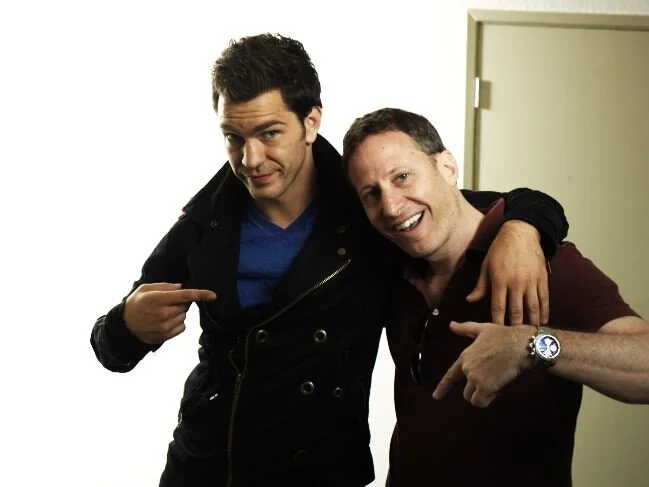Marty Maidenberg is a marketing consultant specializing in brand management and development for a wide range of artists and musicians.
In his 25+ year career in the music industry, Marty has worked for major label record companies, self-starter indies, and as an artist manager. His experience has been honed by building multimillion-dollar artist brands, managing global marketing departments, creating game-changing digital media strategies, and by initiating non-traditional, integrated marketing campaigns. In turn, he has helped to guide and advance the careers of some of the most well-known talent in the business.
In 2011, Marty established M Squared Entertainment providing marketing services and strategic advice for music artists in all aspects of their careers.
LEG: Has music always been a big part of your life? Can you tell us how you got your start in the business and what was that first job experience like?
MM: I think, like most people who enter the business, that music was a passion my entire life. I wanted to work in the industry so badly that I would have taken any available job just to get my foot in the door. I saw an opening at PolyGram Records and applied to be an assistant in the Promotion Department. After three interviews with Human Resources, they told me that the Promotion Department position had been filled but that they would want me for a job with them in Human Resources. A little bait and switch. The key was, if I worked in HR for a year the would allow me to apply for any job open in the company. I was in HR for exactly one week past the year mark and moved into Publicity. I spent that first-year learning about the company and the various departments and so, when it came time to move on, I already knew most of the employees in the company.
LEG: At what point did you decide to start your own company and what led you to that decision? What are some of the pros and cons to working for yourself?
MM: I had been working for major labels all my life – first PolyGram and then Sony – and so, when I went the indie route with S-Curve Records I thought I’d have more flexibility to work with the artists I wanted, rather than being told what to work because they were the label’s priorities. While that proved to be true, S-Curve eventually wound up in the major label distribution system as well. In the end, it became too much “business” and not enough “music” for me. Opening up my own firm, specifically to work with artists on their careers, brought me back to what I most enjoyed about the business. Now I get to work with artists as varied as Sting, Carrie Underwood, and David Duchovny alongside such developing talents as Hannah Gill, AWOLNation, Jay Dref, and Nyah Grace.
So, there are plenty of “pros” to that level of freedom. If I had to point to one “con” I’d say it was the loss of camaraderie that you often get in a big office setting. Big ideas often happen when people interact with one another and, when you’re in business for yourself, it’s harder to maintain those consistent social circles.
LEG: What advice would you offer to a young person starting out and wanting to get into the business today? Is there something you wish you had known in the early days of your career?
MM: Be flexible with the starting point in your career. The current available position may not be the ideal situation or the area of the business in which you envisioned yourself, but you will learn valuable information no matter the role and that all helps you as you move from step to step. As an example, I’ve seen more people hired from intern to full-time position because people get hands-on experience that’s valuable for growth. Being an intern might not be the most glamorous but it can lead to a lot of possibilities.
LEG: What do you consider your biggest accomplishment thus far in your career?
MM: Any time you can take an artist and help them to develop their style, sound, image, and then to implement a campaign that helps them to reach his or her goals, it’s a tremendous feeling. In that sense, I feel like I’ve been lucky enough to have enjoyed so many “accomplishments” throughout my career. One highlight for me was working with Joss Stone from the age of 15 through 20 years old, both as her marketing person and then as her manager. We built a campaign to set up multiple platforms for her to launch her career without the existence of a big hit single. Whether it was being a spokeswoman for The Gap or PETA to the Got Milk Campaign to performing at the Super Bowl with Stevie Wonder or securing acting roles, we really made the most of every aspect of marketing her talent. That first album sold over 6 million copies worldwide. It was quite a ride!
LEG: In a business that’s changed so much since you started twenty-five years ago how have you managed to evolve and grow in such a competitive, fast paced environment?
MM: I won’t lie. It hasn’t always been fun riding the ups and downs of the business. Even so, if you care about the music and stay focused on the artist as a person and not a commodity or product, I think you win most of the time. At its core, the industry needs to be centered around the talent. The various ways to promote or market the artist may change but the important thing is believing in the talent. The rest is just figuring out the best way to maximize what an artist has to offer.
LEG: More and more artists these days are deciding to build their own teams and work with independent consultants like yourself, now more than ever. What are the benefits to artists in going that direction instead of signing a traditional label deal?
MM: When you work as a consultant there are a lot of benefits. Primarily, there’s flexibility – for each artist you’re able to craft your own team of professionals best suited for devoted to that particular artist. It’s not a cookie cutter blueprint into which you plug every artist.
At a label there’s often internal competition for radio slots or promotional pushes. You wind up battling your own labelmates for attention within the company before you even get into the marketplace. As in independent, you’re able to prioritize the needs of your own artists and make the artist the sole focus of your efforts.
Another big advantage is obviously the ownership of the artist’s own material. Artists aren’t giving up percentages at every turn nor are they indebted to anyone for advances when they own their own music. You pay as you go and you remain in control of your own finances (and profits.) Of course, a downside is that you don’t have the financial might of a larger label system, however you also won’t have a bill at the end of your music cycle saying you owe money back.
LEG: What are a few things artists can do themselves to help develop their own brand?
MM: Artists need to be honest about who they are what and what their “brand” is. By that I mean don’t try to be someone or something you’re not. If you’re not honest with the listener they will know it and the truth will come out eventually. Rather than trying to catch up to the latest sound or style, what the public wants to see more than anything in a new artist is something original and unique. Don’t try to copy everyone else. You’re your own best asset in winning people over and creating sustainable fan bases.
LEG: What are a few projects you are working right now that you are excited about heading into the New Year?
MM: I’m working with a new 28 year old artist named Jay Dref who’s simply a phenomenal talent. He’s in the “p’opera” vein of a Josh Groban, mixed with the style of Michael Buble and a vocal range on par with Adele. He’s that good. We’re creating a unique lane for him as there aren’t too many young singers able to tackle the variety of styles and genres that he can. We’ve paired him with superstar producers and writers, like Stephan Moccio (Celine Dion, Miley Cyrus, The Weeknd) and Lauren Christy (Jason Derulo, Kelly Clarkson, Avril Lavigne, Bebe Rexha), to take advantage of his ability to appeal to a wide cross-section of listeners.
I’m also working with Pete Muller, a singer-songwriter who is a true, modern-day Renaissance man. Part-piano man and part-philanthropist, there is nothing Pete can’t do. We’ve got him touring with the likes of Stephen Kellogg and Brendan James, and also playing festivals like the Telluride and Montreux Jazz Festivals. He’s getting great press as People Magazine and American Songwriter have both given him feature coverage already. Pete’s also involved in bringing the Berklee School of Music to NYC as well as being a principle player in saving the Power Station Recording Studio in New York. We’re leaving no stone unturned when marketing Pete.
For more Marty Maidenberg visit:
m2musicconsulting.com






